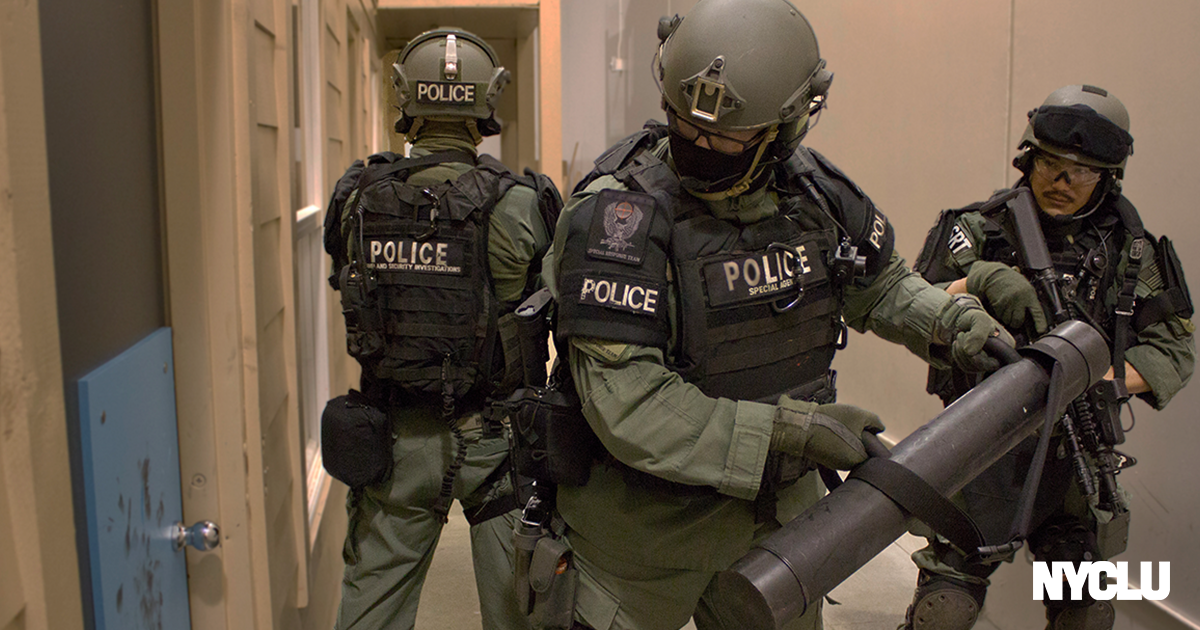A Botched Raid Put an Innocent NY Man in a Hospital. 10 Years Later, He’s Waiting for Justice

A poorly executed no-knock raid put a bullet in an innocent New York man’s stomach. Now a judge’s use of an obscure legal doctrine is keeping him from getting compensated for his injuries a decade after police burst into his friend’s home and shot him.
In the early morning hours of August 19, 2011, Jesus Ferreira was asleep on the sofa in the front room of his friend’s house when a Binghamton Police Department SWAT team burst through the door.
Seconds after entering, the officer in front fired a bullet into Ferreira’s stomach with an assault rifle at point-blank range.
Evidence later revealed police officials had only done a cursory amount of surveillance and failed to seek out a floor plan for the house. As one officer testified, he had “no idea” based on their intelligence who or what they would encounter when entering. And although the SWAT team was mobilized — based on an anonymous tip — to arrest Ferreira’s friend, no arrests resulted from the raid.
Ferreira survived, but had to have surgery to remove his spleen. He sued the city of Binghamton and, after a trial, a jury awarded him $3 million in damages. But a federal district judge threw out the jury’s verdict.
The judge ruled that a legal concept known as the “special-duty rule” prevented Ferreira from collecting damages. That doctrine limits cities’ liability where a person claims city officials failed to protect them from harm. But the judge’s decision, which applied that concept to a case where city officials themselves injured someone, has broad and troubling implications.
A federal appeals court expressed strong skepticism that the judge correctly applied the special-duty rule, but, because the doctrine is a matter of state law, the court referred the case to New York’s highest court.
Ferreira’s case shares many similarities to that of Breonna Taylor.
A ruling against Ferreira could help shield cities from liability in negligence cases for a range of harms inflicted by city employees, including police officers.
Like qualified immunity, a better-known legal doctrine that limits the liability of police officers and other government officials, the special-duty rule is not the result of laws passed by elected leaders, but was created by judges. As applied by the district judge in Ferreira’s case, the special-duty rule would become another major judge-made barrier to police accountability.
We are already used to police officers facing no criminal consequences when they kill or injure people. New York just got another taste of this brand of injustice recently when a grand jury declined to indict officers involved in the killing of Daniel Prude in Rochester. No criminal charges were brought against police officers for the shooting of Ferreira.
This is far too common in cases of deadly police violence. But often, the families of people like Prude have at least been able to secure financial compensation from local governments. The invocation of the special-duty doctrine in Ferreira’s case threatens to put another obstacle in front of victims of law enforcement violence when they try to achieve some small measure of accountability.
On Saturday, the NYCLU filed a friend of the court brief in Ferreira’s appeal of the District Court’s ruling. We argue that the extension of the special-duty rule to cases such as Ferreira’s would violate the New York law that allows cities to be sued for negligence, and would remove an important incentive for cities to avoid the reckless use of dangerous techniques such as no‑knock raids.
Ferreira’s case shares many similarities to that of Breonna Taylor, a Black medical worker who was shot and killed by Louisville police officers in March of last year during a no-knock raid on her apartment. Like Taylor, Ferreira was awoken by police officers in a residential home and shot in a matter of moments. Questions also emerged about the planning of, and necessity for, such a dangerous operation.
Both cases underscore the need to reign in no-knock and quick-knock raids in which police break into people’s homes with often thin or non-existent justifications. Police often approach these raids like military operations against enemy combatants and they have severe and deadly consequences for communities targeted for aggressive over-policing.
A bill introduced in the New York State Legislature would ban these types of raids and the warrants that precede them in all but the most serious cases, like active shooter situations. Suspected drug or property crimes would not be eligible for no-knock warrants, and when officers execute search warrants, they’ll be required to wait at least 30 seconds after announcing themselves unless there is a real-time, verifiable life-threatening risk.
New Yorkers marched in the streets calling for an end to police violence and for those responsible to be held accountable. The expansion of legal doctrines like the special-duty rule, and the broad use of paramilitary operations like no-knock raids, stand in the way of these efforts and they must be stopped.
